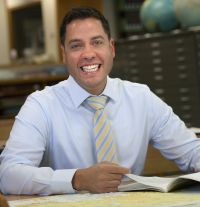Professor Elvin Delgado to study fracking in Argentina, implement new major
January 19, 2015

Central’s Elvin Delgado, assistant professor with the department of geography, was recently awarded a grant for $10,000 to study the social and ecological impacts of fracking, the extraction of shale and natural gases within the earth, in Argentina.
Delgado said he plans to visit Argentina in two trips: the first being a pilot study, and the following trip to conduct his primary research goals.
“My research informs my teaching,” Delgado said. “My hope is that with the data I gather, I can help create policy and also bring all of that information to inform the different things that we cover in class.”
Delgado completed his undergraduate degree in geography and environmental science, and then proceeded to work on a paid internship for National Geographic.
Over the past 10 years, Delgado said he has primarily studied the social and ecological impacts of the extraction of oil and natural gas in Venezuela. Delgado was hired by Central in 2012 as an energy resource geographer, and eventually became director of the energy studies minor.
“When I started [teaching], I realized there was a huge need for a structured program here at Central,” Delgado said.
Further, he discussed current issues with companies in the energy sector and asked what main problems they were facing. Most of them said a large percentage of their employees are retiring, so there is a demand for new employees in the sector.
“I received funding from the president’s innovation fund and the provost fund—a total of $500,000—to establish and develop the institute for integrated energy studies,” Delgado said.
He said there are two main components of the new institute: One is research for contract services and the other is a bachelors of science in integrated energy management.
A proposal for the new institute, which has been in motion for two and a half years, Delgado said, was submitted last Friday to the faculty senate.
“All students will come and take their core courses for the program and then they will choose one out of three specializations,” Delgado said. “They can focus on either integrated energy policy, integrated energy business or integrated power systems.”
Delgado said that the new program is the first in the Northwest that plans to address conventional and alternative energy source issues with a special focus on energy management.
Additionally, selected students would be given the opportunity to complete their degree in a cooperative education program, similar to an apprenticeship. However, this would not be available to all students due to high qualification standards.
“The degree program is bringing 14 departments together from four colleges,” Delgado said. “We have courses from geography, environmental studies, economics, business, communication and physics. Students can do a combination of courses that will give them an expertise in particular areas.”
Delgado said he aims to integrate his research into the design of this new program.
“My personal goal is to be able to effect policy, and to be able to develop scientific results that will be published so that they can be used to inform policy,” Delgado said. “The second thing is to bring this knowledge to students.”
If the new degree program is approved, it will be available for students in fall 2015.

